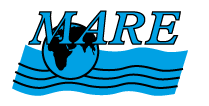Ocean Literacy Framework
What is the Ocean Literacy Framework?
The Ocean Literacy Framework is comprised of three consensus documents:
- Ocean Literacy: The Essential Principles of Ocean Sciences K-12 (also known as the Ocean Literacy Guide)
- Ocean Literacy Scope and Sequence for Grades K-12 (also known as the Scope & Sequence).
- The Alignment of Ocean Literacy to the Next Generation Science Standards (NGSS)
Development of the Ocean Literacy Framework was a collaborative effort involving scientists and educators in the ocean sciences education community, where MARE has held a leadership role from the beginning.
Ocean Literacy Principles
There are seven essential principles, supported by 44 detailed fundamental concepts:
- Ocean Literacy Principle 1. Earth has one big ocean with many features.
- Ocean Literacy Principle 2. The ocean and life in the ocean shape the features of Earth.
- Ocean Literacy Principle 3. The ocean is a major influence on weather and climate.
- Ocean Literacy Principle 4. The ocean makes Earth habitable.
- Ocean Literacy Principle 5. The ocean supports a great diversity of life and ecosystems.
- Ocean Literacy Principle 6. The ocean and humans are inextricably linked.
- Ocean Literacy Principle 7. The ocean is largely unexplored.
The Ocean Literacy Principles are:
- the big ideas in ocean sciences that every student should understand by the end of 12th grade;
- derived from a consensus-building process involving over 100 ocean scientists and educators; and
- a work in progress—they reflect our efforts to date defining ocean literacy.
Scope and Sequence
To facilitate teaching and learning the Ocean Literacy Principles by high school graduation, the ocean sciences education community developed a scope and sequence to show how the principles could be taught at various grade bands. The Ocean Literacy Scope and Sequence is comprised of 28 conceptual flow diagrams, one for each grade band (K-2, 3-5, 6-8, 9-12) for each principle. These diagrams show, graphically:
- the science concepts underlying the principles and how they are connected;
- developmental appropriateness—what students need to know to help them understand the higher level concepts; and
- how instruction of the concepts might “flow.”
Together these documents form the Ocean Literacy Framework. The Framework is a resource for educators and scientists with a “roadmap” that helps them build coherent and conceptually sound learning experiences for students from Kindergarten through 12th grade. Both of these documents are also available in print and download forms.




